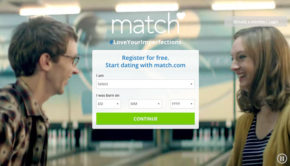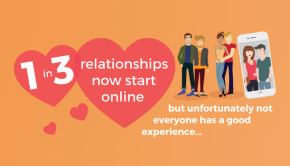Online Dating + Economics = Love?
I often think that many things that have become so popular that they have conquered the whole world have done so not because they are somehow cleverer, more ingenious, fantastic and elitist – no, they are more often simple, easy enough to be grasped by everyone, accessible and human.
That’s right, they’re human. Pizza. Football. Facebook. They are all so immensely popular because all human beings pretty much understand them the same way and get the same kind of satisfaction out of them.
The dating instinct
And so it is also with online dating, although to a lesser degree (not everybody is looking for a date – not everybody needs one). The reason why it’s popular is not because it’s always successful and brings people together in love. In fact if you read the news or listen to what people are saying you find plenty of stories telling the exact opposite. I don’t suppose many apps have an aura that’s more tainted than that of Tinder – yet millions flock to it every day, swiping right, swiping left.
Why is that? Because it’s simple, it’s accessible and in a strange way very human. After all, that’s how mating has worked in nature for centuries, so deep down, underneath all of our culture and social finesse we’re led by instinctual drives.
At least that’s my explanation. There are others, much more sophisticated and scientific at that, too. For example, there’s a professor of economics called Paul Oyer who a few years ago published a book that quickly became popular both inside and outside the world of online dating. It’s called Everything I Ever Needed to Know About Economics I Learned from Online Dating and it compares online dating to an economic market, telling us that it is really no different and has the same logic to it. He used principles of basic economics, how markets work and showed us in his book that it works the same way in online dating – and also, in fact in our everyday life as well.
Professor Oyer isn’t just talking from a scientific, theoretical point of view. As someone who himself went back to the dating scene after 20 years, he was new to online dating and drawing upon his experience as an economist just couldn’t help but looking at it as a market. “It’s one of the most interesting markets out there and there’s just so much economics going on there,” he says in the interview on the Stanford Graduate School of Business Youtube channel.
The numbers game
So – why IS online dating so successful in his view? It’s because he defines it as a ‘thick’ market. It’s a language of economics, but bear with me. “If you go to a mall there are a lot of different stores there with a lot of different goods and a lot of different shoppers, you’re going to find everybody’s more likely to get what they want than if you go to an individual small store in the middle of nowhere. By the same token if you’re thinking about how to approach the dating market, you want to go where the dates are, and so you think about: OK, I want to go on the biggest websites or do I want to sometimes think about going to a more specialised website that’s maybe not as big but has more of the types of people that I want.”
Makes a lot of sense, doesn’t it? In fact, I’m sure you all know this yourselves, without really needing to be a Stanford professor to figure it out. But Professor Oyer also has ideas on how dating sites could actually benefit from more concepts learned from economics. For example, ‘signalling’. He says it’s important to win someone’s trust by signalling that he/she is your primary choice: “One thing that would really enhance the dating market is to have people to be able to send one or two messages a month that say: “I really want to date you – and this is my only I-really-want-to-date-you-message I’m allowed to send this month.”
True enough, that would make us feel a lot more special… except for the fact that if this is your ONLY message and you happen to send it to someone who isn’t that interested in dating you, you’ve wasted your chance for the month and have to wait for next month to come along and keep dating. Not sure most users would have the patience, to be honest.
But one point that Professor Oyer makes and that is spot-on, is the need for verification systems for online dating sites. He claims it would make dating sites a lot more successful if more dating sites would ask their members to verify certain details about themselves – not just appearance, location, age but also height, income and education. “Many dates are wasted on people who tell lies that are quickly figured out,” he claims.
Yes, and don’t we know it! But not only would it help to prevent a lot of heartache from happening, it would also reduce significantly the level of cyber-fraud that is rife within the world of online dating.
There are a lot of great theories about online dating and the reasons of why it’s so popular – and like I said, Professor Oyer’s theory is just one of them. However, it is provoking enough to make us think about the conscious and not-so-conscious decisions we make every day as consumers and how we can make our experiences in that marketplace a bit better and a whole lot more successful.




















